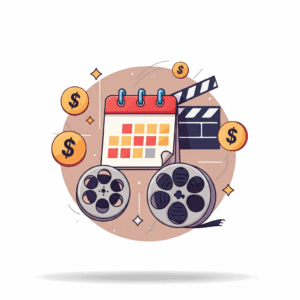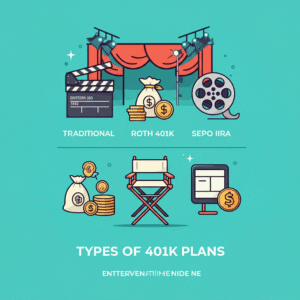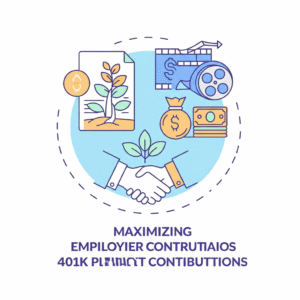
Introduction
Planning for the future is as crucial for professionals in the entertainment sector as becoming proficient in artistic endeavors. Building a secure future through prudent financial planning is just as important as creating an unforgettable present. Here’s where knowing and taking advantage of the advantages of a 401(k) retirement plan designed specifically for the entertainment sector—what we’ll refer to as “401k entertainment”—can really help.
This blog explores the idea of 401k entertainment in great detail. We’ll walk you through how this retirement plan offers flexibility and chances to protect your future, covering everything from enrollment flex plans to different 401(k) contributions, plan types, and how much you should invest each month.

What is a 401(k) Plan, and Why Does It Matter in the Entertainment Industry?
Employees can contribute a percentage of their paychecks to retirement savings through a 401(k) plan, which frequently offers the added benefit of company matching contributions. By delaying taxes on contributions or avoiding taxes on eligible withdrawals, these programs offer tax benefits. What, however, makes it particularly pertinent to the entertainment industry?
Financial planning can be difficult for many workers in the entertainment sector because of their erratic salaries or unconventional work schedules. With its adaptable features, a 401k entertainment plan helps entertainment workers save effectively and adjust to the changing demands of their jobs.
The Importance of 401k Entertainment
- Flexibility for Freelancers and Contract Workers: Many entertainment workers don’t hold steady, full-time positions. 401k entertainment plans, especially plans like Solo 401(k)s or SEP IRAs, accommodate freelancers and independent contractors.
- Employer Contributions for Full-Time Employees: Employer matching contributions can greatly increase retirement savings for those working for major industry organizations, such as production companies, studios, and entertainment service providers.
- Tax Advantages: By offering pre-tax or Roth contributions (post-tax), 401k entertainment options give workers the flexibility to choose how they want to manage tax implications now and in retirement.
With that foundation, let’s break down the key aspects of 401k entertainment.

How Do Enrollment Flex Plans Work in 401k Entertainment?
Usually, the first step to ensuring retirement financial stability is enrolling in a 401(k) plan. Enrollment flex plans offer extra advantages catered to the specific requirements of entertainment professionals.
What is an Enrollment Flex Plan?
Employees can pick from a range of contribution schedules under an enrollment flex plan, which lets them modify their savings in accordance with changing income or particular financial objectives.
Key Features of Enrollment Flex Plans:
- Custom Contribution Schedules: Contributions can be increased during high-income months or reduced during seasons of lower earnings.
- Automatic Settings: Employees can opt for automatic increases in contributions over time, ensuring consistent progress toward retirement goals.
- No Penalty Adjustments: Unlike traditional plans, flex plans often allow for penalty-free changes to contribution amounts.
Why Choose a Flex Plan in the Entertainment Industry?
Actors, sound engineers, and set designers are among the entertainment professionals who frequently work on a project-by-project basis. Prioritizing retirement without sacrificing daily necessities is made simpler with a flex plan, which gives you the flexibility to save in accordance with these cycles.
Is a Flex Plan Worth It?
Of course. Even if your income varies, flex plans help you stay on course. Younger individuals in the business who wish to gradually expand their savings as their careers progress will find them particularly enticing.

Is a 7% 401(k) Good Enough? Maximizing Your Contributions
How much to contribute is one of the most often asked concerns concerning 401k entertainment plans. Is a comfortable retirement possible with just 7% of your income?
The 7% Guideline
Experts in the field frequently advise setting aside 10–15% of your salary for retirement. Nonetheless, 7% can be a suitable starting point for people who are just getting started or have little cash flow.
How 7% Contributions Add Up:
- If you’re making $60,000 annually, a 7% contribution equals $4,200 per year.
- Over 30 years, assuming a 7% annual rate of return, this can grow to $427,515.
Employer Matching Makes It Even Better
In the 401k entertainment industry, a lot of businesses match a portion of your contributions. Saving 7% of your income effectively becomes an 11% contribution with the match if your company matches up to 4%. Your savings growth is immediately accelerated by this.
Is 7% a Solid Long-Term Strategy?
- For Younger Savers: It’s a good start, but try to ramp up over time, as compound growth rewards early and consistent saving.
- For Mid-Career Professionals: Aim to increase your contributions to at least 10-12% if you haven’t been saving consistently.
- For Later-Career Professionals: Consider aggressive contributions of up to the IRS limit to maximize your savings.
Types of 401(k) Plans in the Entertainment Industry
Not every 401k entertainment plan is made equally. Different plan alternatives are tailored to your particular scenario, depending on whether you work as an employee, freelancer, or business owner in the entertainment industry.
1. Traditional 401(k) Plans
- For Full-Time Employees at studios, media companies, or corporations.
- Contributions are made pre-tax, lowering your taxable income upfront.
- You pay taxes on withdrawals during retirement.
2. Roth 401(k) Plans
- Contributions are made post-tax; withdrawals in retirement are tax-free.
- Suitable for those expecting higher income (and tax brackets) in the future.
3. Solo 401(k)
- Designed for self-employed entertainment workers or small business owners.
- Combines employee and employer contributions, allowing annual contributions of up to $66,000 (2023 limit), depending on income.
4. SEP (Simplified Employee Pension) IRA
- Popular among freelance professionals managing multiple gigs.
- Contribution limits are higher, allowing savings up to 25% of income.
5. Safe Harbor 401(k)
- Aimed at small employers in the industry.
- Offers automatic employer contributions with fewer administrative requirements.
Which Type is Best for You?
Your work status determines the appropriate course of action. Full-time employees should think about regular or Roth 401(k)s, whereas freelancers frequently succeed with Solo 401(k)s or SEP IRAs. Knowing the benefits of each kind guarantees that your contributions optimize long-term growth and tax advantages.
Is Contributing $100 a Month to a 401(k) Enough?
Even a tiny contribution to a 401(k) might feel like a financial hardship for many new 401k entertainment professionals. However, over time, modest investments, like $100 each month, can produce surprisingly significant outcomes.
The Power of Starting Small
Even if $100 a month seems minimal, compound growth turns it into a significant sum. For example:
- $100/month invested over 20 years at a 7% return grows to $52,000.
- Over 30 years? That climbs to $122,000.
Starting small allows you to establish the habit of saving, which you can build on as your income grows. Plus, any employer matching dramatically increases your contributions.
What is a “Good” 401(k) Balance by Age?
While $100 a month is a great start, you might wonder how much you should aim to save overall. Here’s a rough suggestion:
- 30s: 1x your annual income
- 40s: 3x your annual income
- 50s: 5-7x your annual income
- 60s: 8-10x your annual income
Small monthly contributions, when started early, make these milestones manageable.

The Value of 401k Entertainment Plans for Your Future
Creativity, passion, and perseverance are the cornerstones of the 401k entertainment sector. An active retirement strategy can be fueled by the same energy. You may take control of your financial future by being aware of the subtleties of 401(k) entertainment plans, including flex plans, contribution techniques, and various plan types.
Here’s a quick recap of how to maximize your 401(k):
- Start Early: Small contributions compound over time.
- Leverage Matching Contributions: Don’t leave free money on the table.
- Choose the Right Plan Type: Align your plan with your employment situation.
- Increase Contributions Over Time: Start with what you can afford and adjust upward as your income grows.
A 401(k) entertainment plan might be your backstage pass to a safe and satisfying retirement if you approach it with the correct attitude. Your financial future needs to be treated like a star, whether you’re directing behind the camera, acting onstage, or helping with the production. Make plans now!





Leave a Reply